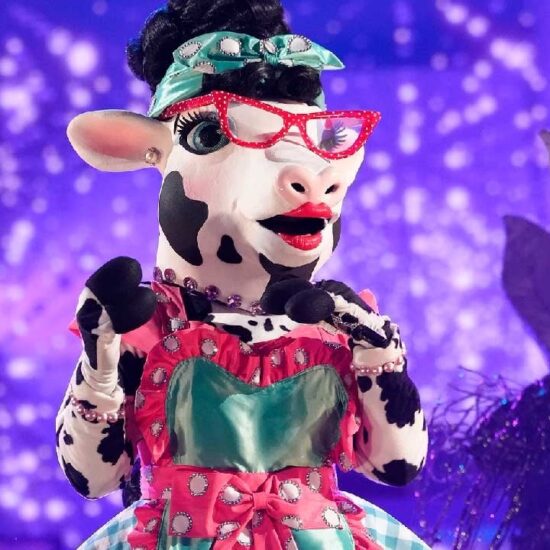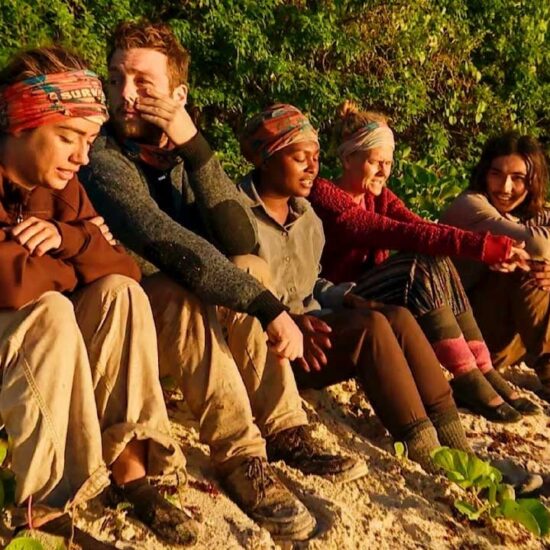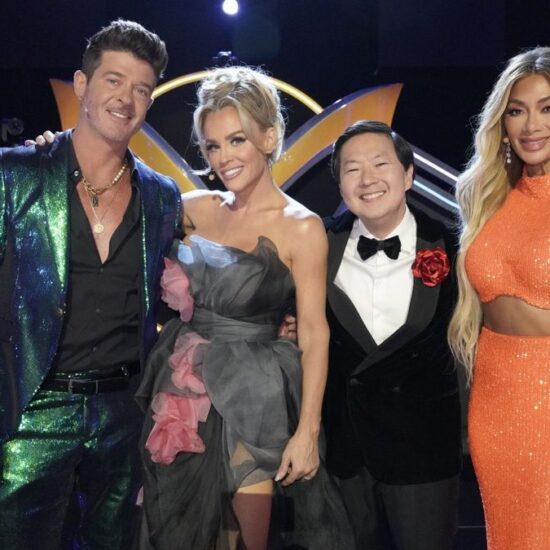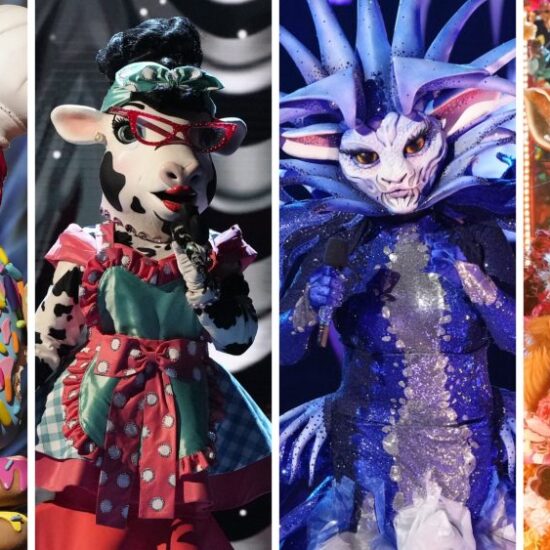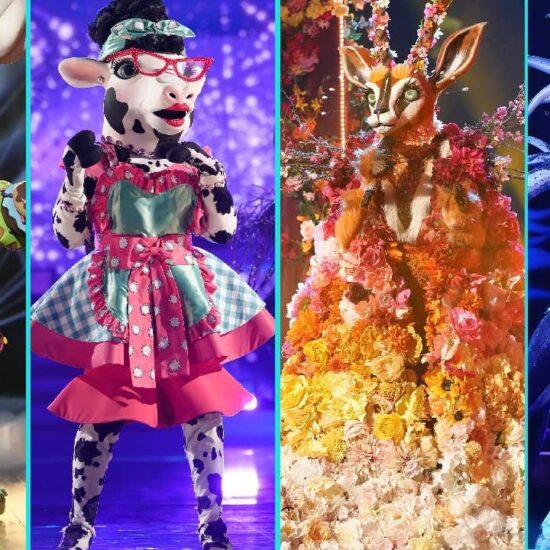

An ending can make or break a series. While I can’t imagine the final moments of Welcome To Chippendales inspiring the same kind of discourse as, say, a certain cut to black, I have to admit I was left speechless when the final credits rolled in the series’ concluding episode. Endings, after all, can help not only punctuate an eight-episode narrative arc but also stress what audiences are to take away from such a journey. So, what are we to make of the final fantasy sequence that closes out this uneven, ambitious exploration of the violent and criminal history of Chippendales, which as the title card reminds us, is “bigger than ever” these days?
At first, I have to admit I laughed out loud. Could this Rajiv Joseph and Robert Siegel-penned episode really have ended with a vision of Steve overseeing a thriving Chippendales venue, happily sharing a Coke with his wide-eyed wife, success at his fingertips, unaware of what’s to come? Surely the juxtaposition of such a raucous vibe with the image of Steve’s corpse being wheeled away in an ambulance after he took his own life awaiting sentencing was to be taken as comical, yes? Or ironic, perhaps? There’s a suggestion that, with his death, Chippendales was able to return to those early glory days. But also that Steve’s many crimes have been wiped away, figments of a more just world that does not exist in a bleary-eyed vision of a club full of women clamoring to see men take their tear-away pants for their pleasure.
That this image of the club features no sign of Nick nor Denise (no Ray, even) suggests we’re in Steve’s mind. Here is a Chippendales scrubbed of anyone else’s input or insight. It’s his alone, embalmed for his pleasure. And ours, it seems. I understand the desire to end with a kind of black comedic punchline. Yet I am not convinced it works. Or, if it does work, I was left wondering what point it was trying to make. It can’t possibly tie into the impunity Steve’s death precipitated. Nor the tragedy of this once promising entrepreneur. Sure, Chippendales outlived (and continues to outlive him—not to mention, outrun his basest instincts), but is that final image meant to be an indictment of his practices or of the system that created him?
As a fantasy prologue, it muddies rather than clarifies Welcome To Chippendales’ purpose. Unless we distill it to mere entertainment; it is much more engaging to end with Nanjiani and a stripping number than with the dour image of Steve’s listless body being wheeled away as two EMTs talk about how much of a hit Chippendales remains (even if, arguably, I also find that scripted moment just as if not more cringe-worthy than this hallucinatory dream vision).
Perhaps I’m overthinking what Siegel and company were trying to convey with such a choice. They did spend the entire final episode less focused on the business at hand and more on an all too elaborate ruse in Switzerland that finally brought Steve to justice. Well, “justice” given that he never did get to be sentenced; justice for what and to whom, we’re left to ask.
For its last few episodes, I bemoaned the way Welcome To Chippendales all but lost its plot. As I’m sure you’re gleaming, the final episode did not stick the landing and made me wonder if I needed even to reassess my excitement for its initial installments. As I suspected, we left much of our story behind and find ourselves now in Switzerland where Ray and Steve are wrapped up in a John le Carré-esque cat-and-mouse entrapment. It remains unclear when this happened because timing and calendar markings haven’t been a strength of Hulu’s limited series.
On paper, this setup brims with possibility. A talky two-hander between two characters allows the series to cram in plenty of exposition into its final hour; there’s an elegant simplicity to it. Best to stay with Steve and his right-hand man and use their incriminating conversation to tie up the show’s many loose ends. This is, after all, the moment where it all finally catches up with Steve. Why not experience it in real-time, almost? And yet there’s a listlessness to their exchange that never quite delivers the tension-building rapport you often get in similarly-framed scenes. Honestly, Ray’s attempts to get Steve to confess to his crimes may have been real and true, but boy do they come off as hilariously amateurish.
Try as they might, the Welcome To Chippendales folks can’t successfully refashion their montage-fueled, ’80s-flared dark comedy into a tense spy/FBI thriller. And that’s before it shifts into groan-worthy “haunted by past sins” territory with a literal ghost spewing out the many sins Steve committed in the name of success. “When you’re someone like me you can’t stop fighting,” he tells the ghost of Nick (himself, really) while thinking back to all the heinous things he convinced himself he had to do to succeed. There may be truth to that—after all, he’d bought into a system that would never have allowed him to succeed or to reap the benefits of such success without a hefty price.
Hearing it spelled out so bluntly, it makes the show feel a lot more didactic than it ever had a right to be. Especially because, as Steve hears the taunts coming from a ghostly Nick (“You are on fucked up, dude”) all the show accomplishes is to, yet again, allow their vision of Steve to rebuke responsibility. In staging this inner monologue as a dialogue between Nick and Steve, the show presents yet another way for Steve to not wholly own up to what he’s done or what he set out to do. Agency, as ever with Welcome To Chippendales’s “Steve,” is elusive. Not even at his lowest is he allowed a modicum of critical self-awareness that’s not filtered through another character.
Therein lies the failure of Welcome To Chippendales. Rather than excavating the inner workings of the real-life Somen “Steve” Banerjee, all it does is (in keeping with that final fantasy sequence) prettify its effects for an agog audience who’s left with very little insight into why such a tragic “American dream gone bad” story ever came to be. But hey, at least we got plenty of fab stripping numbers in the process.
Stray observations
- Murray Bartlett (and Nick, really) deserves better than playing a Ghost of Chippendales past. Honestly, the more I think about the many choices made in this final episode, the more questions I’m left with. (Actually, it’s probably just one question: Why?)
- Along those same lines, Nanjiani deserves better. Getting to deliver lines like “That’s what makes it even more impressive. That I’m doing it all by myself. That’s how it started, right? With just me. I thought of it. Without me there is no Chippendales,” is hard to watch. There is no nuance by the end of the show, just telegraphed ideas that spell out exactly how Steve feels and flatten out any complexity he may have harbored in real life. He is reduced to a failed businessman who parrots the same ideas over and over.
- I’m just gonna say it: The episode needed more Evan Jonigkeit (eating Twizzlers).
- How apt that, following Steve’s lead, this episode is all done in the service of Irene and yet we see no sight of her until she shows up in a fantasy sequence where she’s a picture-perfect, happy, dutiful wife.








